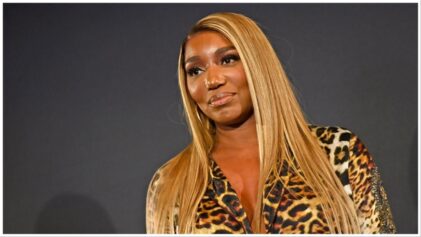Three days after Real Housewives of Atlanta star, Nene Leakes announced her husband, Gregg Leakes was “transitioning to the other side”, it was announced on Wednesday Gregg had succumb to colon cancer after a four year battle. Black doctors say early screening could have helped save him and encourage African-Americans to be screened before it is too late.
“When we’re diagnosed with colon cancer, we’re diagnosed at higher stages and we have a higher risk of dying from colorectal cancer, so we’ve been talking about for years having colorectal screenings for African Americans at 45,” said Dr. Cedrek McFadden, a Board-Certified Colorectal and General Surgeon in South Carolina.
Dr. Cedrek McFadden says there are several reasons why African-Americans are at higher risk than other racial groups.
“It’s not just one single reason why African Americans have higher risk, like genetics, the types of food or the exercise sometimes it’s those years or levels of systemic racism that are so pervasive in medicine,” said McFadden.
The American Cancer Society reports colorectal cancer rates are 20% higher for African Americans and death rates are 40% higher compared to other racial groups.
Dr. McFadden also points to many African-Americans’ reluctance to open up about their health which serves as a barrier.
“I sometimes see people in their 60s or 70s that have had years of symptoms and will come in and say I’ve had this for some time, but they just kept it to themselves, where they felt shameful and didn’t talk about those types of problems, or were prideful and that is to our detriment,” said McFadden.
Dr. Charles Rogers is an Assistant Professor of Public Health at the University of Utah School of Medicine. He has spent the last decade focusing on colorectal cancer awareness and prevention among Black men.
“For us, we have the highest chances of getting CRC, and dying from it compared to everybody males and females so me and you as Black men, we have a 47% higher chance of dying from colorectal cancer than a white man and a 24% higher chance of getting it. Those numbers are similar for Black women too,” said Rogers.
Dr. Rogers says just as we mark the one-year anniversary of Chadwick Boseman’s death also from colon cancer, it is sad to hear about Gregg Leakes’ passing.
“If this was the first time, [Gregg Leakes] he’s getting screened at age 63, had he been screened earlier, it could have saved his life,” said Rogers.
The CDC says people should begin regular screenings for colon cancer by age 45. If you have a family history of colon cancer, screenings should begin even earlier. Doctors McFadden and Rogers say colon cancer does not just appear out of nowhere, instead it develops over time.
Michael Sapienza is the CEO of the Colorectal Cancer Alliance. He notes a startling trend, the disease is impacting people at younger ages.
“We’ve seen over the last 10 years a 2% increase of people under the age of 50 getting the disease every year. It will be by 2030 the number one cancer killer for people under 50 in this country,” said Sapienza.
Some of the symptoms and warning signs include:
- Change in bowel habits
- Blood in or on your stool
- Diarrhea, constipation or feeling that the bowel does not empty all the way.
- Abdominal pain or cramps that don’t go away
- Unexplained weight loss
Some of the risk factors include:
- Minimal physical activity
- Diet low in fruit and vegetables.
- A low-fiber and high-fat diet
- diet high in processed meats
- Overweight and obesity
- Alcohol consumption
- Tobacco use
- Diabetes
- HIV
Dr. Rogers hopes the unfortunate passing of Gregg Leakes encourages more African-Americans to open up about their health.
“It’s a preventable disease nobody has to die from. Family secrets kills generations so hopefully what’s going on in the news right now will cause more Black people to have more conversations to ask, hey did anybody in our family have diabetes or did they have heart disease, or did they have colon cancer because it may save generations to come,” said Rogers.


